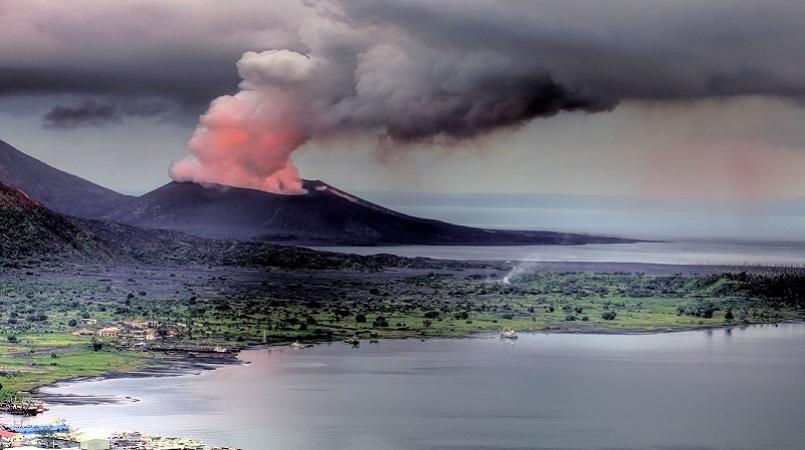
The stench of Sulphur invaded their nostrils and clung to their clothes as they left their home and everything they owned behind them.
The young mother’s silent tears made tracks down her dusty face as she tightly clutched her baby to her chest with one hand while the other was clenching their small, hastily packed bag. She made her other two children hold hands and walk in front of her as they joined the throng of people who were fleeing from the spewing volcanoes.
It was the morning of September 19, 1994, when Vulcan and Tavurvur began erupting on opposite sides of the Rabaul Town harbour in East New Britain.
This woman’s story is just one of the thousands of untold tales recounting how Rabaul residents managed to survive the terrifying event.
My family and I were living at Kokopo that time when the volcanoes erupted.
My younger siblings and I were taken out for a morning stroll at the golf course when we noticed angry, dark plumes of smoke rising out of Vulcan (western end of Rabaul caldera).
We excitedly rushed back to wake our sleeping parents and tell them of this strange phenomenon.
Mom and dad hastily got into the car, drove off and returned with boxes of biscuits and plastics of food. They then got back into the car and returned hours later looking worse for wear in a vehicle caked with layers of mud.
While the car was getting hosed down, we learnt that our parents had gone to Rabaul to lend a helping hand. They were just like other residents of the province who, instead of staying put where they were safe, rushed out to help fellow wantoks.
“The sight that greeted us when we neared Rabaul was the mass of people fleeing for their lives. It was very heartbreaking,” mom recounted.
However, she said it wasn’t as chaotic as one would expect it to be; police were out in force, controlling people’s movement.
“The village elders knew that there was going to be another eruption, based on their 1937 experience.”
In 1937, Tavurvur and Vulcan exploded, killing more than 500 people and causing extensive damage.
Prominent ENB historian, Gideon Kakabin, told Loop PNG that even though the 1994 eruption had a devastating effect on the town, he only knows of four deaths.
“That was because volcanologists had been anticipating an eruption. They carried out awareness to the Rabaul residents as well as practiced drills. That was why the people knew where to go to when the volcanoes erupted.”
Most of the people had been evacuated the night before, when intense earthquakes started.
The Oregon State University described this feat as “a tremendous success for science, for that night and the next few days, nearly 50,000 people were removed from a place of great danger to safety. Rabaul did not become a great tragedy, but was a great triumph!”
Twenty-two years have now passed.
The beautiful, laid back and historical Rabaul town of East New Britain Province is slowly rising from the ashes.
During our country’s 41st independence day celebrations, I noted how the business houses in the province as well as schools, churches, government offices and the general public, worked together to make the event a memorable one.
I will never forget the colourful and exciting Frangipani Festival float parade, where more than 50 vehicles convoyed around Rabaul town with horns tooting in rhythm to blaring music.
Groups of people, mostly children, were standing at the back of the vehicles, screaming at the top of their lungs while others danced.
There was no need to buy food simply because companies were throwing their products out to the laughing crowd.
I was struck by how organised everything was, not to mention safe. By the end of the parade, we were laden with snacks like crackers, Lae Snax biscuits, lollies and cream buns. We even managed to get a can of drink from the Pacific Industries truck, after we failed to catch it and it landed head first into the ground.
The float, held on Saturday (Sept 17), focused on the coconut palm as the ‘tree of life’. Members of the Rabaul Historical Society, led by chairman of the organising committee, Susan McGrade, should be applauded for such a thrilling line-up of events.
Now I can see why the Port Moresby-Rabaul flight I was on was fully packed. Heck, if it was possible, people would probably be standing, just like in PMV buses.
The Frangipani Festival celebrates the survival of Rabaul after the 1994 twin volcanic eruptions that almost completely destroyed the township.
The festival is named after the frangipani flower, which was the first plant to blossom in the midst of the ashes and until today, the sweet smell permeates the streets of Rabaul town.
I was sorry to say good bye to this delightful place that I proudly call home. I learnt the importance of unity and ownership during my five-day stay there.
As long as you keep on working together, Rabaul will become the bustling city it once was; a place unmatched by its beauty, culture and spectacular tourist sites, combined with its respectful and peace-loving people.
